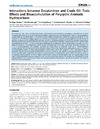Please use this identifier to cite or link to this item:
https://accedacris.ulpgc.es/jspui/handle/10553/75470
| Title: | Interactions between Zooplankton and Crude Oil: Toxic Effects and Bioaccumulation of Polycyclic Aromatic Hydrocarbons | Authors: | Almeda García, Rodrigo Wambaugh, Zoe Wang, Zucheng Hyatt, Cammie Liu, Zhanfei Buskey, Edward J. |
Editors: | Johnson, Stephen J. | UNESCO Clasification: | 251001 Oceanografía biológica | Issue Date: | 2013 | Journal: | PLoS ONE | Abstract: | We conducted ship-, shore- and laboratory-based crude oil exposure experiments to investigate (1) the effects of crude oil (Louisiana light sweet oil) on survival and bioaccumulation of polycyclic aromatic hydrocarbons (PAHs) in mesozooplankton communities, (2) the lethal effects of dispersant (Corexit 9500A) and dispersant-treated oil on mesozooplankton, (3) the influence of UVB radiation/sunlight exposure on the toxicity of dispersed crude oil to mesozooplankton, and (4) the role of marine protozoans on the sublethal effects of crude oil and in the bioaccumulation of PAHs in the copepod Acartia tonsa. Mortality of mesozooplankton increased with increasing oil concentration following a sigmoid model with a median lethal concentration of 32.4 µl L−1 in 16 h. At the ratio of dispersant to oil commonly used in the treatment of oil spills (i.e. 1∶20), dispersant (0.25 µl L−1) and dispersant- treated oil were 2.3 and 3.4 times more toxic, respectively, than crude oil alone (5 µl L−1) to mesozooplankton. UVB radiation increased the lethal effects of dispersed crude oil in mesozooplankton communities by 35%. We observed selective bioaccumulation of five PAHs, fluoranthene, phenanthrene, pyrene, chrysene and benzo[b]fluoranthene in both mesozooplankton communities and in the copepod A. tonsa. The presence of the protozoan Oxyrrhis marina reduced sublethal effects of oil on A. tonsa and was related to lower accumulations of PAHs in tissues and fecal pellets, suggesting that protozoa may be important in mitigating the harmful effects of crude oil exposure in copepods and the transfer of PAHs to higher trophic levels. Overall, our results indicate that the negative impact of oil spills on mesozooplankton may be increased by the use of chemical dispersant and UV radiation, but attenuated by crude oil-microbial food webs interactions, and that both mesozooplankton and protozoans may play an important role in fate of PAHs in marine environments. | URI: | https://accedacris.ulpgc.es/handle/10553/75470 | ISSN: | 1932-6203 | DOI: | 10.1371/journal.pone.0067212 | Source: | Plos One [ISSN 1932-6203], v. 8 (6), e67212 (Junio 2013) |
| Appears in Collections: | Artículos |
WEB OF SCIENCETM
Citations
147
checked on Jun 8, 2025
Page view(s)
102
checked on Aug 10, 2024
Download(s)
38
checked on Aug 10, 2024
Google ScholarTM
Check
Altmetric
Share
Export metadata
Items in accedaCRIS are protected by copyright, with all rights reserved, unless otherwise indicated.
